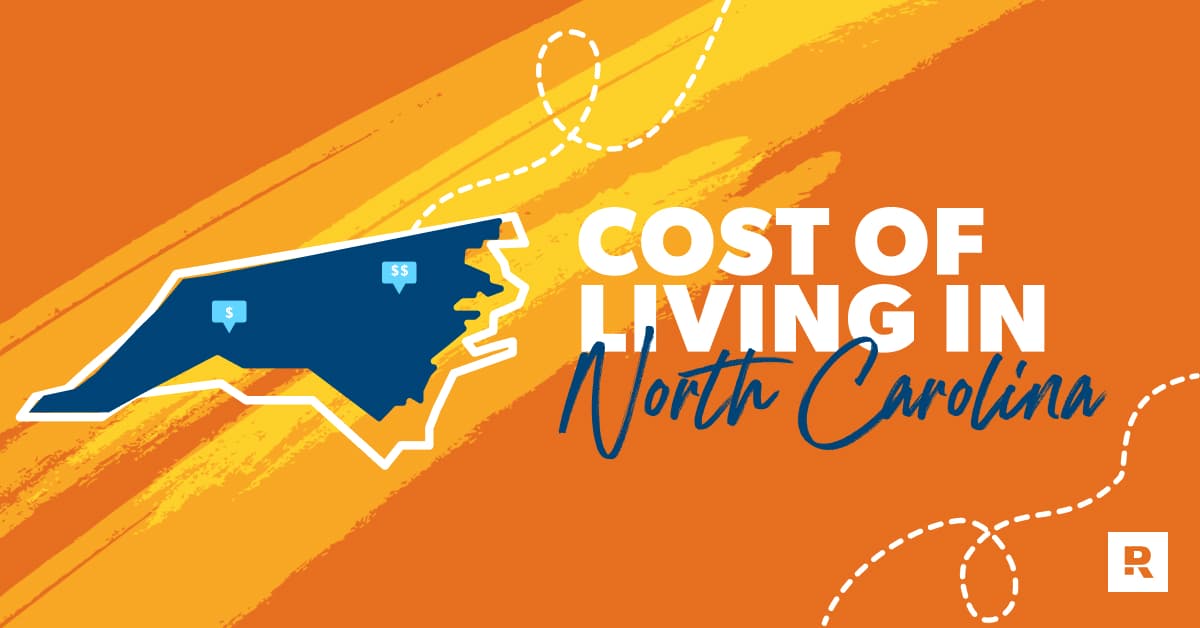
Key Takeaways
- The average cost of living in North Carolina cities is about 2% lower than in the average U.S. city.
- The cost of living among individual cities in North Carolina ranges from 12% lower to 9% higher when compared to the average U.S. city.
- Low housing prices can be found in smaller cities, but move to the mountains, the beach or a big metro area, and you’ll see way higher housing prices.
- Miscellaneous goods and services cost around the national average in North Carolina.
So, you’re thinking about moving to North Carolina. Rock on! It’s a great state with a lot to offer, like the Blue Ridge Mountains, the Outer Banks islands, and some awesome art, music and sports teams. (Go Panthers!)
North Carolina could be a great place for you to live. But before you go, you’ve got to know: Just how much is all that living going to cost?
Let’s look at the true cost of living in North Carolina. We’ll walk you through how much you can expect to pay for things like housing, utilities, transportation or even just a haircut.
Here we go!
What’s the Average Cost of Living in North Carolina?
The average cost of living in North Carolina cities is about 2% lower than in the average U.S. city. So North Carolina is sort of like a Goldilocks state: It isn’t too expensive or too cheap to live there. If you currently live someplace expensive, you can expect to save a little money by moving there. But if you already live someplace really cheap, your cost of living will likely go up in North Carolina.
How do we know? We look at the Cost of Living Index (COLI) published quarterly by the Council for Community and Economic Research (C2ER). The COLI compares five cities in North Carolina with hundreds of other cities around the country. Unless otherwise stated, all the numbers in this article come from that index.
On the COLI, the number 100 represents the national average cost of living. Anything below 100 means North Carolina is cheaper than average in that category. Anything above 100 means North Carolina is more expensive. Make sense?
But keep in mind that while the state average is 2% below, there’s a wide range in cost of living among individual cities in North Carolina, ranging from 12% lower to 9% higher when compared to the average U.S. city. Let’s take a look at the cost of living of some of the best places to live in North Carolina:
|
City |
COLI Number |
|
107 |
|
|
109 |
|
|
88 |
|
|
95 |
|
|
90 |
To better understand these numbers, let’s take a closer look at some of the most common individual categories of expenses.
Housing
North Carolina has some amazing places to live—from mountain towns to big cities. And in June 2025, the median price of a single-family home was $425,000. That’s about 3% lower than the national median price of $440,000.1
And good news for renters: The median monthly rent for a two-bedroom apartment in North Carolina is $1,144. That’s 18% lower than the national median of $1,387.2 (Hey, sometimes renting has benefits!)
Those low prices could have you speeding over to North Carolina like you’re on a NASCAR pit crew. But remember, housing prices vary depending on where you go in the state.
You could enjoy low housing prices if you move to a smaller city like Winston-Salem, where a home costs around $355,000 and an apartment costs about $1,026 a month.3,4 But move to the mountains, the beach or a big metro area like Raleigh, and you’ll see way higher housing prices. Check it out:
|
North Carolina Metro Area |
Median Home Price |
Median Apartment Rent* |
|
Asheville |
$596,500 |
$1,288 |
|
Wilmington |
$499,900 |
$1,265 |
|
Raleigh |
$462,473 |
$1,410 |
|
Charlotte |
$454,500 |
$1,284 |
|
Winston-Salem |
$354,9925 |
$1,0266 |
*Median Apartment Rent numbers refer to two-bedroom apartments.
So, how do you find housing that fits into your budget? That’s up next. Read on!
What to Do About Housing Costs
When you move, you’ll have to decide if you should rent or buy. But whichever you choose, you should always stick to the 25% rule.
What’s that? We’re glad you asked!
We teach people to spend 25% or less of their take-home pay on housing—and that includes insurance, HOA fees and property taxes.
That may sound extreme, but there’s a reason behind it. If you overspend on housing, you won’t have anything left to live on. But the 25% rule helps you make sure you have enough money left each month to cover emergencies, pay off debt, save for retirement, and enjoy your new city.
To get a better idea of how much house you can afford, use our Mortgage Calculator. Just plug in a home price and your 20% down payment to see what your monthly mortgage would be if you actually bought that house. Remember, if it’s more than 25%, you may need to look for a different house—or even a different city in North Carolina.
Don’t buy or sell without an agent you can trust.
There are RamseyTrusted real estate agents all over the country who are ready to help you win.
Utilities
North Carolina’s got hot, humid summers if you live in the Piedmont region or on the beach—and cold, snowy winters in the mountains. So you’ll either be cranking up the AC or dialing up the heat! Fortunately, you’ll pay over 5% less for utilities here than in the average U.S. city.
Of course, like housing prices, utility prices vary based on where you live. Utilities cost 5% more than the national average in Charlotte. But utilities cost 10% less than average in Raleigh.
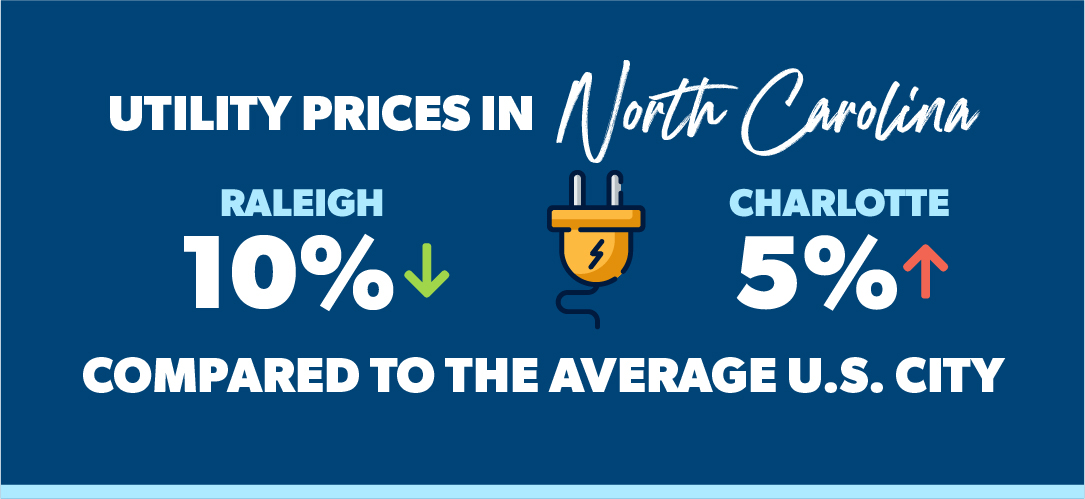
Groceries
North Carolina’s got some grocery stores you may never have heard of—like Publix, Harris Teeter and Food Lion. Wherever you do your shopping, groceries cost about the same here as they do throughout the U.S.
And grocery prices hold pretty steady across North Carolina. The most expensive groceries in the state are in Durham, and even then, you’ll pay about the same as the national average. And in the Charlotte area, groceries cost 5% less than average.
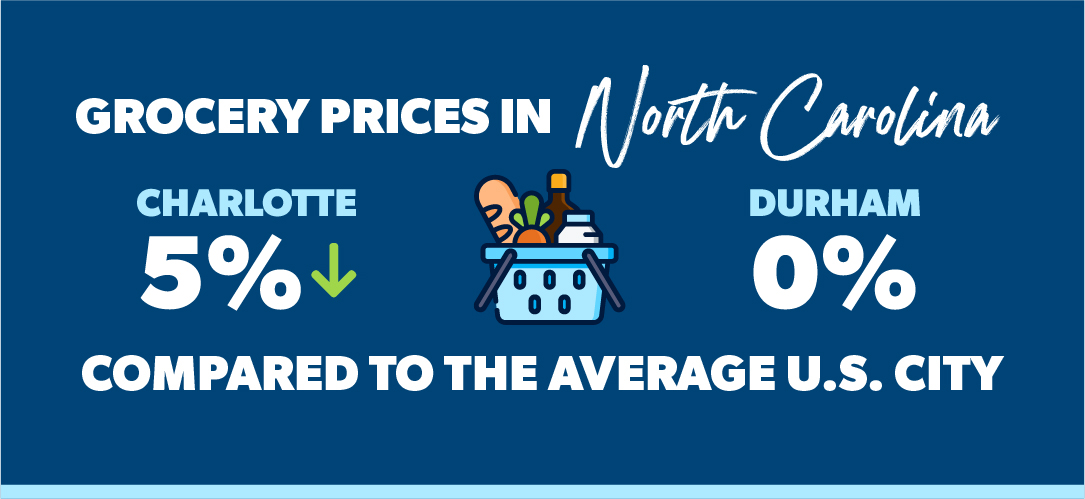
Transportation
Transportation costs include things like gasoline and oil changes. In North Carolina, you can expect to pay 8% less for these things than in the average U.S. city.
Like the grocery costs, transportation costs are also fairly even across the state, and all are below the national average. Surprisingly, Charlotte has the highest costs at 2% below average. And Raleigh has the lowest costs at a whopping 11% below the average.
By the way, in North Carolina you’re never more than a few hours from the mountains or the beach. So you may just find yourself itching to hop in the car and hit the road for a long weekend. Before you do, make sure you get the right car insurance from an agent you can trust.
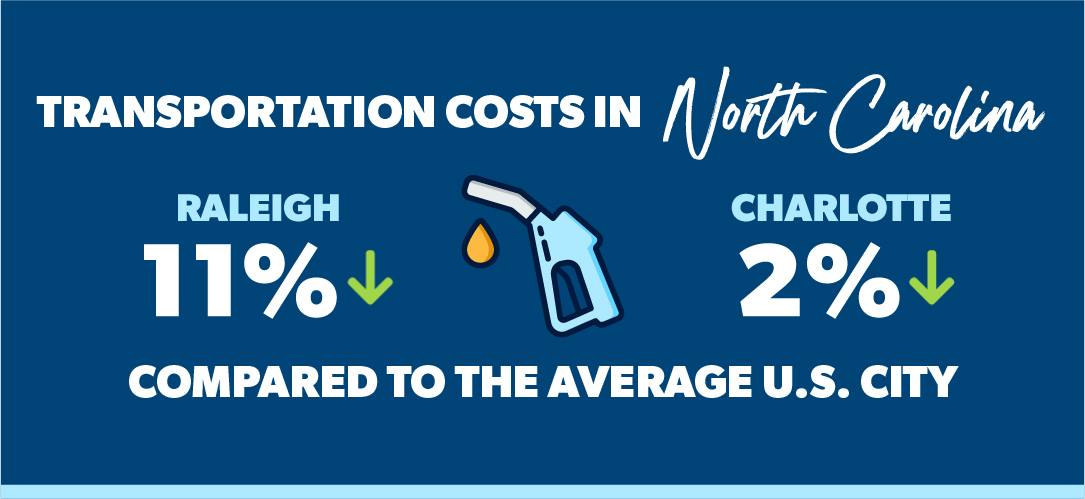
Health Care
North Carolina is known for fantastic health care systems and tons of medical and pharmaceutical companies. But how do the state’s health care costs compare to the rest of the country? They’re 10% higher.
You’ll get the cheapest health care in Charlotte, at 11% below the national average. The most expensive health care is in Durham, which is 30% higher than average. In the middle of the road, you’ll find Asheville . . . but it’s still 12% higher than in the average U.S. city.
Here’s a breakdown of what you can expect to pay for common types of health care in Winston-Salem and around the country:
|
Health Care Type |
Winston-Salem Cost |
Average U.S. City Cost |
Cost Difference |
|
General doctor |
$182 |
$150 |
+21% |
|
Dentist |
$106 |
$122 |
-13% |
|
Eye doctor |
$162 |
$138 |
+17% |
|
Ibuprofen |
$11 |
$11 |
0% |
|
Prescription drug |
$31 |
$22 |
+41% |
Taxes
Taxes—yuck! This part of the cost of living in North Carolina isn’t fun. Actually, it isn’t fun anywhere, which might be why people forget that taxes affect their cost of living when they move to a new state.
North Carolina is one of only 12 states with a flat income tax rate.7 That means everyone gets taxed the same percentage of their income, no matter how much or how little money they make. In North Carolina, the 2024 state income tax rate was 4.5%. And good news: The state is working on lowering that rate to 3.99% by 2026.8 Even better news if you’re a business owner, because North Carolina is set to reduce its already low corporate income tax rate to zero (yes, zero) by 2030!9
Of course, you’ve also got sales tax and local tax to think about too. North Carolina has a fairly low sales tax at 4.75%. The average local tax rate is 2.25%.10 But remember, not every city has local taxes. You can talk to your real estate agent to find out what the taxes are like in the specific area where you’re looking to buy.
And when you’re ready to file your first North Carolina tax return, we’ve got the people and programs to help you do it all. Check out our trusted tax services.
Miscellaneous Goods and Services
This category covers everything from entertainment to personal care. Want to eat at a restaurant or take the kids to the zoo? Need to buy a shirt for work or stock up on your favorite toothpaste? Yep, that all goes here.
In North Carolina, miscellaneous goods and services cost around same as the national average. So you won’t lose a ton of money, but it’s nothing to sneeze at either. These costs are lowest in Charlotte (9% below average) and highest in Asheville (9% above average).
Raleigh is the midrange city. Here, you can get a haircut for $29, buy a shirt for $31, or catch a movie for $14. The national average cost for those items is $27 for a haircut, $39 for a shirt and $13 for a movie ticket.
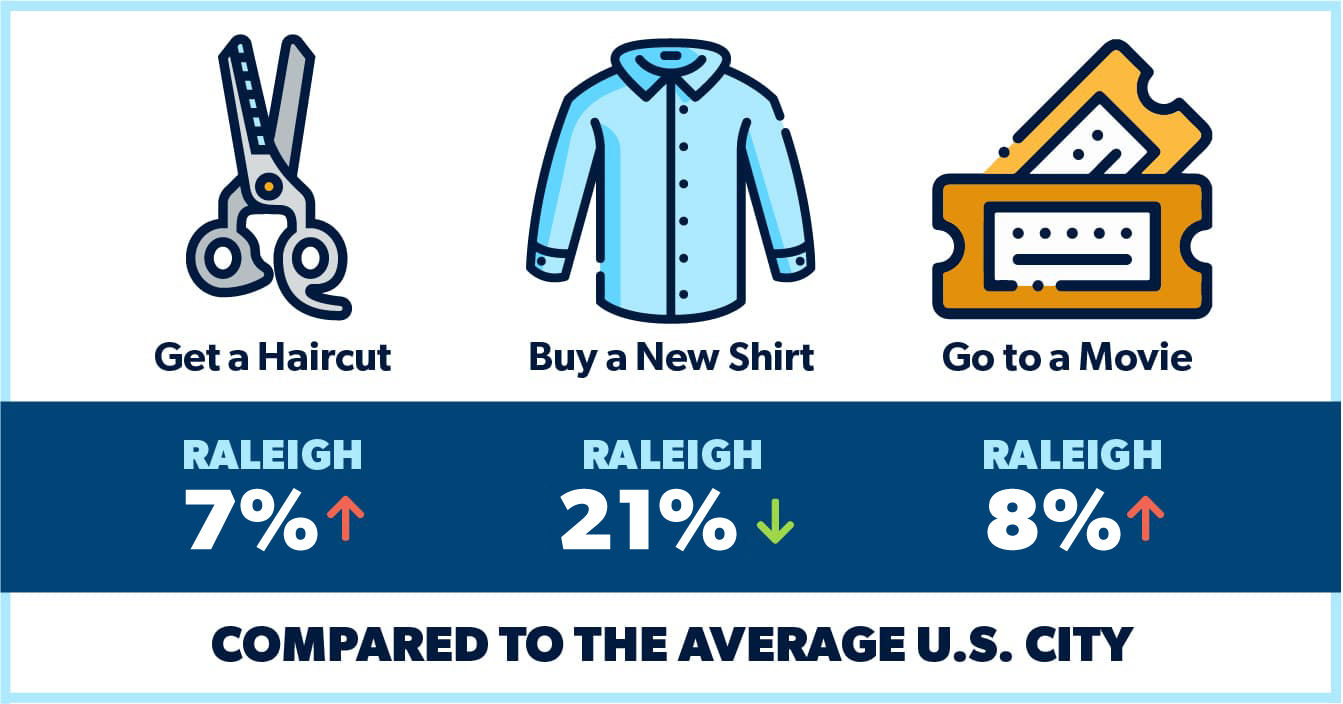
How Much Do You Need to Live Comfortably in North Carolina?
The median income in North Carolina is $69,904.11 But we’ll be honest with you: Living comfortably isn’t just about how much money you make. It’s about what you do with that money.
Wherever you live, you have to take charge of your money and tell it where to go—instead of wondering where it went. When you stick to a written budget, you may find that you can actually afford to live in a more expensive city if you lower some other costs. Or you may realize you need to look for a place with a lower cost of living so you can reach your financial goals.
North Carolina’s Lowest Cost of Living by County
If you’re looking for some of the most affordable places to live in North Carolina, you may want to check out some of these counties:
- Graham County
- Jones County
- Caswell County
- Alexander County
- Montgomery County
- Robeson County12
Now, living in these places might put you farther away from big cities and all the cool things they have to offer. But living in a smaller, more affordable town can also put you closer to your money goals. (Plus, it gives you a great excuse for a road trip!)
Compare the Cost of Living in North Carolina With Your Current City
Okay, so you know how North Carolina’s cost of living compares to the average U.S. city. But what about your city?
That’s important to find out! Because the reality is, there’s a huge difference between knowing groceries cost more in North Carolina and actually paying for those groceries every week. To see how your city stacks up, try our free Cost of Living Calculator.
And if you’re thinking North Carolina’s just a little too expensive right now? That’s okay—there’s hope! You may be able to make up for that higher cost of living if you:
- Change your standard of living (do you really need all those fancy memberships and organic groceries?).
- Look for ways to raise your income, like a side hustle or a better-paying job.
- Move to a more affordable zip code near your desired city (commuting through North Carolina’s beautiful scenery can’t be all bad).
Ready to Move to North Carolina?
Once you’ve done all the calculations and the pros outweigh the cons of moving to North Carolina, you’ll need to find a place to live that fits your budget and lifestyle. And if you’re in the market to buy a little piece of the Old North State, be sure to seek out an expert real estate agent to help you make the move. We recommend partnering with a RamseyTrusted® agent.
These top-performing real estate agents can help you find the best place to live in North Carolina. From choosing the right neighborhood for your family to picking the perfect house (or selling your old one), they’ll walk you through the whole process. And these guys and gals are RamseyTrusted—so they always put serving ahead of selling.
Next Steps
- Use our free Cost of Living Calculator to get a good idea of whether you can afford to live in North Carolina.
- Figure out how much it’ll cost to move, and make a plan to save up that amount.
- Work with a RamseyTrusted real estate agent. We can connect you with an agent in your area to help sell your current house and with an agent in North Carolina to help you buy your next house.
Did you find this article helpful? Share it!

We Hear You!
We’re considering adding the ability to save articles to your Ramsey account.




